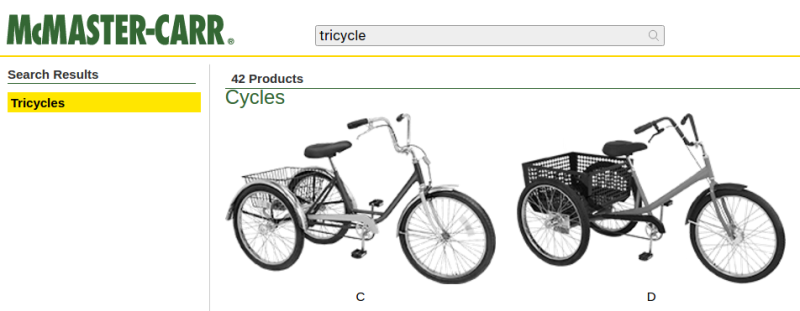For the penny-pinching basement hacker, McMaster-Carr seems like a weird go-to resource for hardware. For one, they’re primarily a B2B company; and, for two, their prices aren’t cheap. Yet their name is ubiquitous among the hacker community. Why? Despite the price, something makes them too useful to ignore by everyday DIY enthusiasts. Those of us who’ve already been enlightened by the McMaster-Carr can design wonders with a vocabulary of parts just one day away at the click of a button.
Today, this article is for those of us who have yet to receive that enlightenment. When used wisely, this source of mechanical everything brings us a world of fast parts at our fingertips. When used poorly, we find nothing but overpriced stock components in oversized shipping boxes.
Since we, the McMaster-Carr sages, are forever doomed to stuff our desk drawers with those characteristic yellow baggies till the end of time, we thought we’d give an intro to the noobs that are just beginning to flex their muscles with this almighty resource. Grab another cup of coffee as we take you on a tour of the good and good-grievances of McMaster-Carr.
Getting to Know Your Future One-Stop Shop
So what is it? What exactly puts McMaster-Carr into the vocabulary of every single engineer who’s ever built something in their career? Well, simply put, McMaster-Carr shines as a one-stop hardware shop with a massive inventory, an easy-to-browse online catalog, and a speedy turnaround time from the moment you push the buy button to the moment parts land on your door. With such a ubiquitous name, we might think they’d do more, but that’s it! What’s special about their cause is that they’ve built an extremely well-tuned system for getting parts into the hands of engineers. Let’s take a quick tour of what’s on the table.
Half a Million Components

First off, their inventory variety is massive — as in: over 550,000 unique components. McMaster-Carr isn’t just an online replacement for your home improvement store. While your everyday Home Depot has many types of screws, McMaster-Carr has every type of screw, or close to it. Did you need set screws, shoulder screws, or wood screws? Oh yeah? How long do you need them? What thread type? Countersunk or Buttonhead? Metric or Jurassic? And that’s just the typical settings. For the niche user with refined tastes, there’s also vented, wire-locking, and sealing screws.
Minimum Quantities Banished
Yellow journalism aside, McMaster-Carr has almost every type of screw. For your even more niche screw tastes that they can’t satisfy, I’d suggest RAF Hardware. Nevertheless, with a vendor like RAF, we hobbyists quickly bump into the dreaded minimum-order roadblock. Yep, I needed a few custom standoffs. Nope, I didn’t need 1000 custom standoffs; but, by golly, I sure hope my friends want to fistfight over the other 996.
McMaster-Carr has no such minimum quantity. Apart from ordering, let’s say, a 25 pack of “jellybean” parts like screws and nuts, most orders wont conscript you into a minimum purchase of 99 extra parts. For the hardware hacker, no minimum quantity is a convenience that saves us from filling our basement with the sins of ordering bulk.
Bullet Checkout that Cuts to the Chase
And the convenience goes one step further. Actually placing an order with McMaster-Carr is easy–almost too easy. If you’ve ever ordered from a place like Misumi, you’ll probably remember those curbside bumps in the checkout process. First you enter your fake company name; then you enter a fake purchase order so that your fake purchasing department can add it to their system; then you schedule a delivery date so that your fake shipping/receiving center is ready for your incoming parts… and so-on and so-forth.
These steps are enough to make the hobbyist fumble and stumble before they can get their order out the door, but not with McMaster-Carr. After configuring your address and credit card once, hit the order button, and–boom: it’s ordered! Careful though! By removing all the conventional “safety locks” of punching in your credit card and entering your shipping address every time we make an order, it’s extremely easy to mail goodies to the wrong doorstep. I’ve had the strange-but-true experience of sending goodies to my former college, my mother, and my previous landlords. Word from the wise: update your default address each time you change venues.
Lightning Quick Delivery in an Oversize McMaster-Box
Before we get too trigger happy with that bullet-checkout, don’t forget that there’s no getting off cheap. Where McMaster-Carr saves us time, they’ll leave a nasty gouge in our pockets if we’re not careful with what we buy.
Let’s do a case study with some stock aluminum. Here, a 6061-T6 grade aluminum rod that’s 36-in. (914.4 mm) long and 0.25-in. (6.35 mm) in diameter will cost us $2.24 at Online Metals. On McMaster-Carr, it’s a whopping $5.27 for the same part — more than twice as expensive! Why on earth would anyone snag the McMaster-Carr flavor for twice the price?
Here’s the difference. From the McMaster Help Webpage: Most orders are delivered the same or next business day at standard ground rates. That means that the McMaster-Carr rod will land on my doorstep today or tomorrow for the ground shipping price. If we’re designing a long-term project with a faraway deadline, maybe we can wait til next week for some stock components to arrive. But if we’re prototyping with lots of unanswered questions, if we’ve messed up the design and need slightly different sized parts, or if we goofed our machining and need to remake a part and still hit our deadlines, McMaster-Carr comes to the rescue with parts that are in our cart at 5PM and on our doorstep the next morning. That next-day convenience will cost us a premium in part prices, but sometimes it’s worth it. The next time you order parts from McMaster-Carr, keep that speed/price exchange in mind.
It’s worth wondering: how on earth does McMaster-Carr achieve almost-guaranteed next-day delivery for most of their parts? There are mighty forces of abstraction at work here, but I thought I’d just highlight the two that we’re most likely to encounter on the receiving side.
First is the penny-pinching hacker’s worst nightmare: hidden fees. When we order from McMaster-Carr, we don’t know how much ground shipping will cost us until after we’ve placed our order. This quirk is most-likely because, quite frankly, at that moment when we just clicked order, McMaster-Carr doesn’t know either. McMaster-Carr has special partnerships with a host of local package delivery businesses across the US. Behind the scenes I imagine a complicated system all geared up to get your package to you ASAP. When we order from McMaster-Carr, we’re admitting that we put such a premium on parts that we don’t care about the small fees along the way.

Next is McMaster’s oddball shipping box sizing formula. Order a packet of screws, and–behold: a shipping box that about 20 times too big!
After ordering one-too-many parts from them, I quickly realized that McMaster-Carr has a pretty limited vocabulary of box sizes for shipping. On top of that, they tend to pick the absolute largest box possible without upsetting customers enough to phone in and ask if someone needs an optometry appointment. Point being: shipping boxes tend to be laughably oversize.
Jokes aside, I’ll bet that these box-sizing standards play a triple role in McMaster-Carr’s promise of speed. First, they’re likely a computer-suggested size based on back-of-the-envelope weight and volume calculations from our order. Next, these standardized boxes must have a maximum capacity weight spec, which would help provide estimates to the delivery businesses that need to prepare for getting truckloads of them out the door. Finally, on the bottom of some boxes, we’ll actually discover a load spec, some of which are actually rather strong. What this means is that McMaster-boxes boxes of the same size will support stacking. Now, I wont assume this next bit, but I can’t help but wonder if these boxes let the shipping folks play a nice game of Tetris inside the delivery truck.
With all these quirks so far, just remember: McMaster-Carr pulls out all the stops to optimize for speed.
An Engineer’s Shopping Experience
Ok, we’ve ogled over McMaster-Carr’s wares for long enough; let’s now take a look at the actual shopping experience.
First, I’ll admit my first moment for shame: sadly, the oh-so-coveted hard-copy of their catalog gets sent only to a handful of customers annually. What is this elitism? Admittedly, we basement hackers are scavengers. We’ll never climb to the top of the food chain to merit a hard copy of this catalog. (To be fair, we can’t be too salty over not getting a hard copy since some of us would likely use it as a bludgeoning weapon anyways.) Nevertheless, their website features the same inventory, so, with some disappointment, let’s focus on the web browsing experience.
CAD Models
Once we narrow our search down to an actual part, odds are good that specific parts come with an attached CAD model. Having the actual CAD model is a great way to evaluate if a design will work before committing to the actual parts. (Shhh! It’s also a sneaky way for McMaster-Carr to sink its feelers into our project to get us to commit to their components.) Attaching a CAD model to a webpage isn’t anything new in the hardware engineering community. In fact, it’s a clear way of communicating what’s being sold.
Searching By Category
McMaster-Carr’s catalog is best searched by category, not brand. In fact, searching by brand usually leads to a dead-end. For instance, punching Panavise into the search bar turns up no hits. However, searching for “vise” and then clicking the circuit board vise subcategory takes us to an item that’s almost unmistakably a Panavise product. Should we mark this drawback as a ding in credibility? After all, some engineers will crusade for certain brand-name items like Mitutoyo Calipers. Why would McMaster-Carr seem to deliberately make brand-related searches hit a dead end?
McMaster-Carr caters to a very specific, dare I say: engineering, mindset of shopping. Here, we adopt a requirements-and-constraints mantra, where we say: “I don’t care what brand does this best, any solution will do for me, as long as it satisfies my constraints.” For “jellybean” hardware components like nuts, screws, and standoffs, this mindset cuts to the chase. Do we really need an audition from each vendor to tell us that their screws are so much better than their competitors? Of course not. No particular screw brand trumps the other, and this brand-agnosticism is where the categorical search feature helps us find something that does exactly what we need without wasting time.
Order-by-Description:
Let’s make one thing clear first: if you’re searching McMaster-Carr for a specific brand that you can find elsewhere, remember that you’ll pay a premium price to get it to your doorstep next day. It’s also subject to those aformentioned “dead-ends” since McMaster-Carr just isn’t setup for brand-specific searches.

Nevertheless, I hear the skeptics now. “Over 550,000 components and I can’t find my trusted brand of wire crimpers?” Fear not. One of McMaster-Carr’s better kept dirty secrets is the ability to order a part simply by describing it! At the cart level, enter a vague description of your part into the part number field, and a magical text box appears asking you to describe your part. Here, if you really do have a specific brand in mind, is where you can enter a manufacturer part number. Keep in mind that a human will need to help you find your specific part in this case, so you may sacrifice the next-day shipping feature by going this route.
Tuned for the Engineer
McMaster-Carr has been wooing the engineering community since 1901. Over the years they’ve developed a finely tuned shopping experience tailored exclusively to engineers. There are no ads, no brand-specific endorsements, just a no-nonsense categorical search into one of the largest industrial part databases with the promise of next-day delivery. Admittedly, there are some drawbacks. We can’t shop by brand. We can’t preview shipping costs until after receiving our order. Nevertheless, as a complete package, McMaster-Carr still seems to land in the vernacular of every engineer. For the noobs to this resource, we hope you work around the kinks faster than your predecessors; and, of course, if we missed something, let us have it in the comments.
Easter Eggs
Think you’ve browsed to the end of all things in the McMaster-Carr Catalog? Just how savvy is your McMaster-Fu? We’re curious: what’s your most bizarre encounter on the McMaster-Carr catalog? On our end, we’ve seen everything from coffee makers to entire buildings. Let us know in the comments.

















For those in United Kingdom looking for McMaster parts, try Raptor Supplies. They started as a Grainger UK reseller but focus on selling US brand industrial supplies and deliver to Europe. They source from outside their online catalog as well
https://www.raptorsupplies.co.uk/b/mcmaster-carr-europe-uk-distributor
by the way a great article.
I think the author’s comments about “mystery” shipping charges are overstated. My experience with MC is that shipping is never expensive. I haven’t ordered recently, but in most cases I’ve paid maybe $5.00 for what appears to be an almost flat rate for small to moderate sized items. For myself then, the shipping fee isn’t really all that mysterious.
Shipping fees may well have increased since my last order, but given my experiences of the past I won’t lose any sleep over it.
Another important aspect about mcmaster is their quality.
I you buy a pack of screws, every one of it will be top quality.
But from digikey for example only half of them have proper threads.
Pro tip: McMaster Carr sells chocolate bars, candy and office snacks.